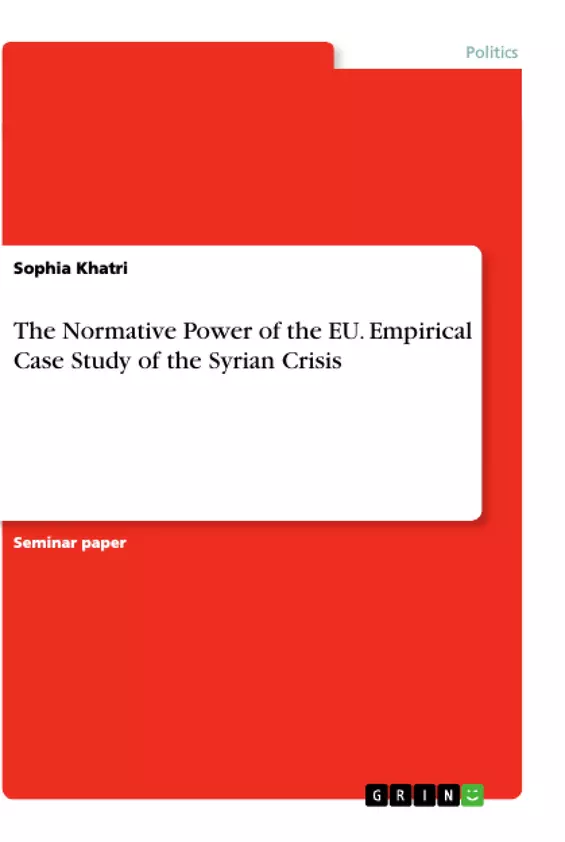This article analyses the extent to which the European Union (EU) constitutes a normative power in its response on the Syrian Conflict. Normative power Europe is examined along principles, actions and impact. The empirical analysis focuses on two norms: democracy and human rights. According to analysis, taken measures by the EU have been moderate and
less influential on the national level while the value promotion on the reginal level could prove its normative power.
For several decades EU foreign policy analysis is concerned with the question of European Union (EU) actorness and the role of EU in international politics. Analysts are talking of the EU as a Military Power, Civilian Power, Soft Power or Cultural Power. General discussion of conceptual frameworks of the Normative Power Europe has become immensely popular in the EU studies and has provoked substantial debate. At the same time, the EU has been experiencing a dramatic change in its direct neighborhood. Syrian Arab Republic, the country located in the heart of Middle East, turned into a new hybrid war and the region was overwhelmed with one of the worst humanitarian crises the world has faced in the 21st century. About 5.6 million Syrians are recent refugees in neighboring countries, 11.7 million Syrians are in need of humanitarian assistance internally and over 560.000 became victims of the Syrian war. The extent and continuation of the conflict also has a destabilizing impact and turned the neighborhood into a “ring of fire”. The displacement of people, the exacerbation of political and sectarian differences and the spread of terrorism are forming a new threat to the democratic institution of the EU.
Inhaltsverzeichnis (Table of Contents)
- Abstract
- Introduction
- Normative theory by lan Manners
- Methodology and Case Study: Syrian Crisis
- The normative base
- Action
Zielsetzung und Themenschwerpunkte (Objectives and Key Themes)
This article investigates the extent to which the European Union (EU) acts as a normative power in its response to the Syrian conflict, focusing on the principles of democracy and human rights. The study examines the EU's actions, their impact, and the effectiveness of its value promotion efforts.
- EU as a Normative Power
- Impact of EU Actions on Syria
- Normative Power and the Syrian Conflict
- Democracy and Human Rights in EU Foreign Policy
- EU Crisis Management and Diplomatic Response
Zusammenfassung der Kapitel (Chapter Summaries)
The article begins by introducing the concept of "Normative Power Europe" and its significance in EU foreign policy analysis. It then delves into the case study of the Syrian conflict, outlining the EU's response and its approach to managing the crisis. The article examines the EU's normative framework, focusing on principles of democracy and human rights, and explores how these norms are diffused through various actions, such as political dialogue, strategic communications, and targeted sanctions. The analysis also considers the EU's use of conditionality in its dealings with the Syrian government.
Schlüsselwörter (Keywords)
The key terms and concepts explored in this article include normative political theory, norms, democracy, human rights, Syrian Conflict, EU crisis management, diplomatic response, value promotion, and conditionality.
Frequently Asked Questions
What does "Normative Power Europe" mean?
It refers to the EU's ability to shape conceptions of "normal" in international relations through principles like democracy and human rights rather than military force.
How did the EU respond to the Syrian crisis?
The EU used diplomatic responses, political dialogue, targeted sanctions, and humanitarian assistance to promote its values during the conflict.
Was the EU's normative power effective in Syria?
Analysis suggests that while measures were moderate on a national level, value promotion on a regional level demonstrated aspects of normative power.
What norms are central to the EU's foreign policy?
The core norms examined in this study are democracy and human rights, which the EU attempts to diffuse globally.
What is the "ring of fire" mentioned in the abstract?
It refers to the destabilized neighborhood of the EU, where conflicts like the Syrian war lead to displacement, terrorism, and threats to democratic institutions.
- Quote paper
- Sophia Khatri (Author), 2020, The Normative Power of the EU. Empirical Case Study of the Syrian Crisis, Munich, GRIN Verlag, https://www.grin.com/document/997787



